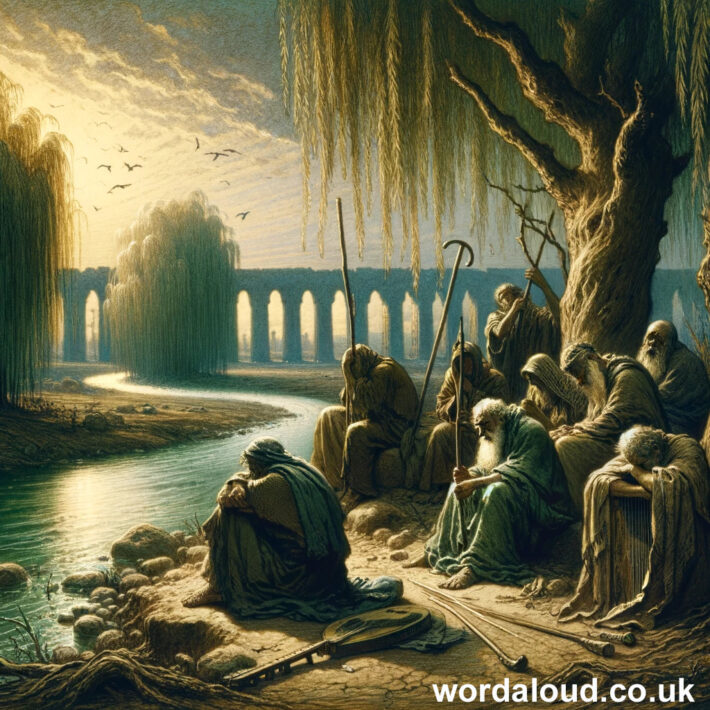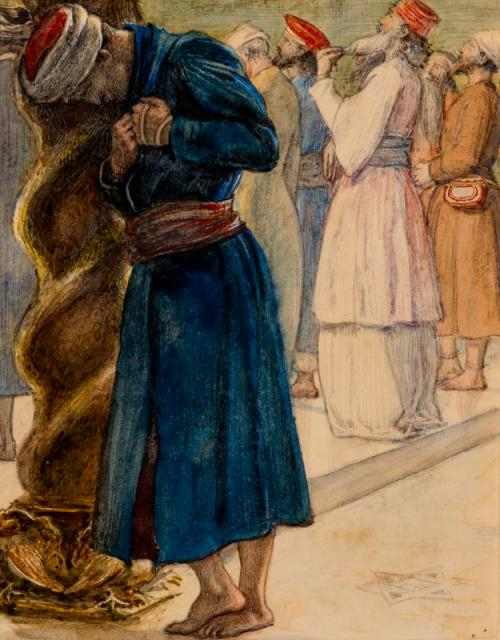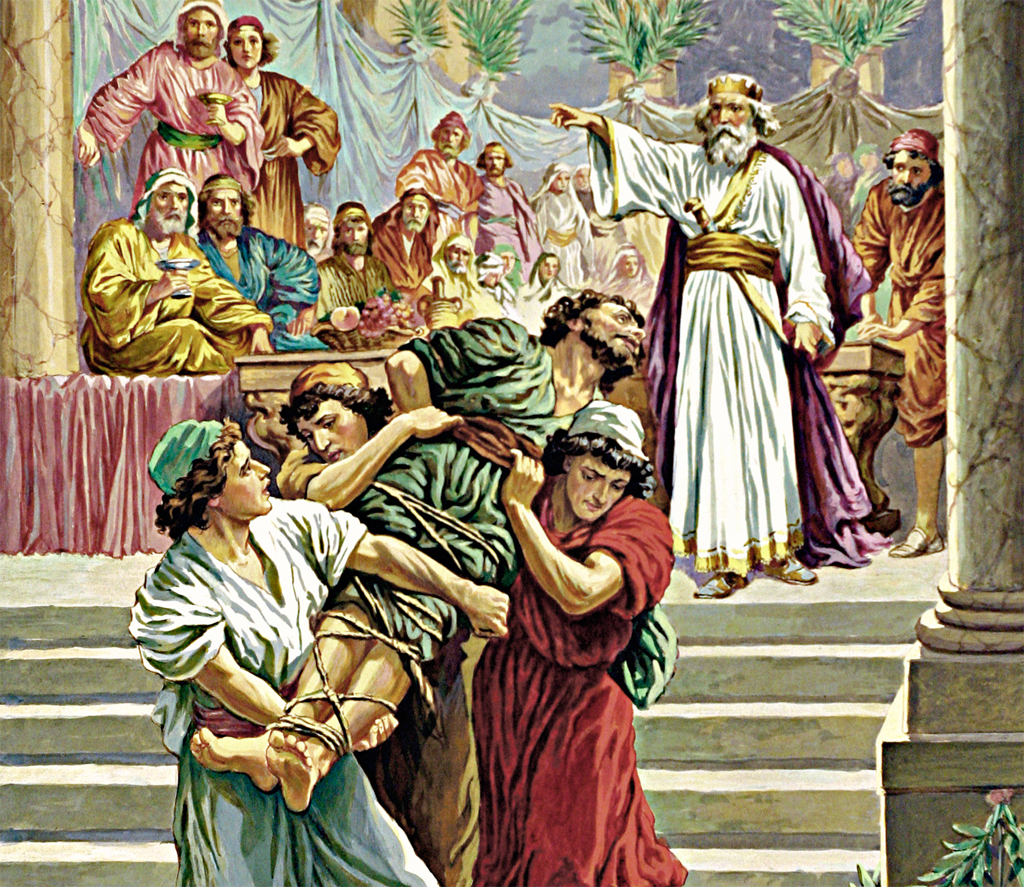Christian Art | Prayer With Jesus | Psalms | Lament Over The Destruction Of Jerusalem | By The Rivers Of Babylon, There We Sat Down And Wept | King David As A Boy | Audio KJV | Love Revealed By Jesus Christ | King James Audio Bible
Psalm 137 | King James Audio Bible
YouTube: Psalm 137 KJV | By The Rivers Of Babylon | King James Audio Bible
Psalm 137 expresses complexities of exile and displacement. The psalm’s candid expression of sorrow, defiance, and longing for justice offer insights into an enduring human struggle to maintain identity and to seek justice in the face of overwhelming odds.
Psalm 137 is an historical testament to the Israelites’ Babylonian Exile and also universal expression of the human condition under oppression and displacement. This psalm extends beyond its immediate context to speak to any who have known the pain of being torn from their homeland and the struggle to maintain identity in the face of adversity.
The psalm’s opening lines, set by the rivers of Babylon, do more than depict physical geography; they evoke a landscape of emotional exile. The rivers, typically symbols of life and nourishment, become in this context stagnant pools of sorrow. This sharp contrast between the expected symbolism of rivers and actual experience of the exiled Israelites is an impact of displacement on one’s perception of the world.
As the psalm progresses, refusal to sing the songs of Zion in a foreign land is not merely an act of sorrow, but an act of resistance. In the face of their captors’ demands, the Israelites’ silence becomes a powerful statement of defiance and an assertion of identity. This act of refusal is a complex interplay of grief, pride, and resistance, emblematic of the struggle to retain cultural and religious identity in oppressive circumstances.
The psalm’s middle verses, vowing never to forget Jerusalem, elevate the city of Jerusalem, Zion, from a mere physical location to a symbol of hope and identity. Jerusalem here is not just a city; it is the embodiment of faith, culture, and national identity. This intense personification of Jerusalem speaks to the enduring connection between people and their homeland, a theme that transcends time and geography.
Transition to the plea for retribution in the latter part of the psalm reflects a shift from introspection to outward expression of anger and desire for justice. This cry for vengeance, while disturbing in its graphic nature, is a raw and honest depiction of the psychology of the oppressed. These verses challenge the reader to confront the darker aspects of human emotion that arise from injustice and suffering.
The unresolved ending of the Psalm adds to its depth and realism. Unlike many other psalms, Psalm 137 does not resolve into praise or reconciliation. Instead, it leaves the reader with a sense of lingering injustice and unresolved grief. This lack of resolution mirrors the reality of many historical and contemporary experiences of exile and oppression, where closure and justice often remain elusive.
In broader interpretation, Psalm 137 transcends its historical context to speak to the universal experience of displacement, loss, and longing. The psalm’s themes of remembering one’s roots, the struggle to maintain identity in a foreign land, and the desire for justice resonate across cultures and epochs. This psalm, therefore, serves not only as a historical record but also as a profound piece of human literature, reflecting an enduring human struggle against displacement and oppression.

![]()
Psalm 137 | King James Audio Bible
By the rivers of Babylon, there we sat down, yea, we wept, when we remembered Zion.
We hanged our harps upon the willows in the midst thereof.
For there they that carried us away captive required of us a song; and they that wasted us required of us mirth, saying, Sing us one of the songs of Zion.
How shall we sing the LORD’s song in a strange land?
If I forget thee, O Jerusalem, let my right hand forget her cunning.
If I do not remember thee, let my tongue cleave to the roof of my mouth; if I prefer not Jerusalem above my chief joy.
Remember, O LORD, the children of Edom in the day of Jerusalem; who said, Rase it, rase it, even to the foundation thereof.
O daughter of Babylon, who art to be destroyed; happy shall he be, that rewardeth thee as thou hast served us.
Happy shall he be, that taketh and dasheth thy little ones against the stones.

![]()
Psalm 137 | King James Audio Bible
- Exile And Longing For Homeland: The psalm vividly expresses the sorrow and longing of the Israelites in Babylonian captivity, yearning for their homeland, Zion.
- Memories Of Zion: The intense emotional connection to Zion is a central theme, as the exiled Israelites remember their homeland with deep affection and longing.
- Loss Of Joy And Music: The hanging of harps on willows symbolizes the loss of joy and the inability to sing the Lord’s song in a foreign land, reflecting the deep cultural and spiritual dislocation experienced in exile.
- Commitment To Jerusalem: The psalmist’s vow to never forget Jerusalem signifies a profound commitment to their cultural and religious identity, despite being in a land of captivity.
- Desire For Retribution: The latter part of the psalm expresses a raw desire for retribution against the captors (Babylonians) and those who rejoiced in Jerusalem’s downfall (Edomites), reflecting the anguish and bitterness of the exiled community.
- Complex Human Emotions: The psalm encompasses a range of intense emotions, from deep sorrow and longing to bitterness and desire for vengeance, illustrating the complexity of the human response to trauma and loss.

![]()








